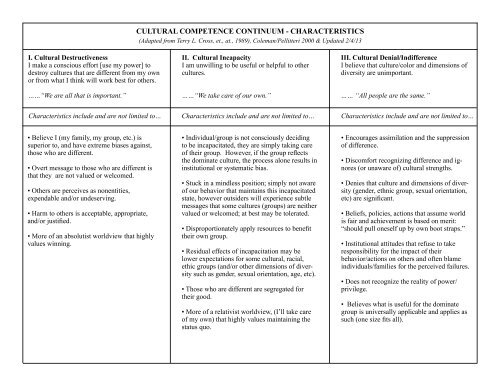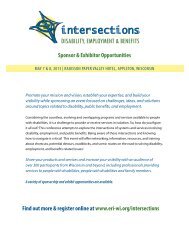Cultural Competence Characteristics (pdf)
Cultural Competence Characteristics (pdf)
Cultural Competence Characteristics (pdf)
Create successful ePaper yourself
Turn your PDF publications into a flip-book with our unique Google optimized e-Paper software.
CULTURAL COMPETENCE CONTINUUM - CHARACTERISTICS<br />
(Adapted from Terry L. Cross, et., at., 1989), Coleman/Pellitteri 2000 & Updated 2/4/13<br />
I. <strong>Cultural</strong> Destructiveness<br />
I make a conscious effort [use my power] to<br />
destroy cultures that are different from my own<br />
or from what I think will work best for others.<br />
……“We are all that is important.”<br />
II. <strong>Cultural</strong> Incapacity<br />
I am unwilling to be useful or helpful to other<br />
cultures.<br />
……“We take care of our own.”<br />
III. <strong>Cultural</strong> Denial/Indifference<br />
I believe that culture/color and dimensions of<br />
diversity are unimportant.<br />
…… “All people are the same.”<br />
<strong>Characteristics</strong> include and are not limited to…<br />
<strong>Characteristics</strong> include and are not limited to…<br />
<strong>Characteristics</strong> include and are not limited to…<br />
• Believe I (my family, my group, etc.) is<br />
superior to, and have extreme biases against,<br />
those who are different.<br />
• Overt message to those who are different is<br />
that they are not valued or welcomed.<br />
• Others are perceives as nonentities,<br />
expendable and/or undeserving.<br />
• Harm to others is acceptable, appropriate,<br />
and/or justified.<br />
• More of an absolutist worldview that highly<br />
values winning.<br />
• Individual/group is not consciously deciding<br />
to be incapacitated, they are simply taking care<br />
of their group. However, if the group reflects<br />
the dominate culture, the process alone results in<br />
institutional or systematic bias.<br />
• Stuck in a mindless position; simply not aware<br />
of our behavior that maintains this incapacitated<br />
state, however outsiders will experience subtle<br />
messages that some cultures (groups) are neither<br />
valued or welcomed; at best may be tolerated.<br />
• Disproportionately apply resources to benefit<br />
their own group.<br />
• Residual effects of incapacitation may be<br />
lower expectations for some cultural, racial,<br />
ethic groups (and/or other dimensions of diversity<br />
such as gender, sexual orientation, age, etc).<br />
• Those who are different are segregated for<br />
their good.<br />
• More of a relativist worldview, (I’ll take care<br />
of my own) that highly values maintaining the<br />
status quo.<br />
• Encourages assimilation and the suppression<br />
of difference.<br />
• Discomfort recognizing difference and ignores<br />
(or unaware of) cultural strengths.<br />
• Denies that culture and dimensions of diversity<br />
(gender, ethnic group, sexual orientation,<br />
etc) are significant.<br />
• Beliefs, policies, actions that assume world<br />
is fair and achievement is based on merit:<br />
“should pull oneself up by own boot straps.”<br />
• Institutional attitudes that refuse to take<br />
responsibility for the impact of their<br />
behavior/actions on others and often blame<br />
individuals/families for the perceived failures.<br />
• Does not recognize the reality of power/<br />
privilege.<br />
• Believes what is useful for the dominate<br />
group is universally applicable and applies as<br />
such (one size fits all).
IV <strong>Cultural</strong> Pre-<strong>Competence</strong>:<br />
I realize that my responses to cultural difference<br />
are more often than not culturally destructive<br />
and I am trying to understand how to<br />
respond culturally competently/proficiently.<br />
“Often have nice written policies, but limited<br />
action.” The operative word is “trying.”<br />
<strong>Characteristics</strong> include and are not limited to…<br />
V. <strong>Cultural</strong> <strong>Competence</strong><br />
<strong>Cultural</strong> <strong>Competence</strong>: <strong>Cultural</strong> competence is<br />
characterized by a commitment to social and<br />
economic justice. “Foster mutual adaptation to<br />
difference to create environments that are useful<br />
for all.”<br />
<strong>Characteristics</strong> include and are not limited to…<br />
VI. <strong>Cultural</strong> Proficiency<br />
<strong>Cultural</strong> proficiency means that I hold culture<br />
in high esteem and that it is my organizing<br />
frames of reference and the foundation by<br />
which I understand relationships between individuals,<br />
groups, organizations, systems, etc.<br />
“Optimal, universal, inclusive and proficient.”<br />
<strong>Characteristics</strong> include and are not limited to…<br />
• Expressed commitment to valuing diversity<br />
but no clear plan for achieving organizational<br />
cultural competence.<br />
• Works at being inclusive.<br />
• Ceases to expect those who are different<br />
will suppress their difference and at same<br />
time is not sure what to do when difference is<br />
expressed – resulting in movement towards the<br />
status quo.<br />
• Recognizes the need for consumer/family<br />
involvement and at same time often not sure<br />
how to integrate this voice/involvement.<br />
• Expressed commitment to human/civil rights<br />
and social justice, as we define them.<br />
• Beginning to realize ethnocentric beliefs<br />
distort one’s vision about those who are<br />
different.<br />
• Beginning to question the validity of<br />
segregation and/or assimilation.<br />
• Recommends the need for improved services<br />
to specific poorly served populations, with no<br />
action.<br />
• Maintains a parental attitude towards the<br />
marginalized group; positive outcomes are<br />
associated with how close the marginalized<br />
group can approximate the dominate group<br />
in terms of language, appearance, values and<br />
beliefs.<br />
Effective plan and demonstrated actions of individuals/organizational<br />
cultural competence, which<br />
includes and is not limited to:<br />
• Mindfully behave in a manner that demonstrates<br />
a value for diversity.<br />
• Participants in rigorous/on going self examination<br />
into the manner in which culture/heritage influences<br />
perceptions, attitudes and behavior about<br />
(and towards) those who are culturally different.<br />
• Works at being inclusive.<br />
• Ceases to expect those who are different will suppress<br />
their difference.<br />
• Willingness to stay engaged with others to<br />
integrate their values, beliefs and associated<br />
needs into decision-making and action.<br />
• Demonstrated commitment to human/civil rights,<br />
social justice, as defined by the marginalized<br />
individual/group.<br />
• Actively develops cross-cultural knowledge<br />
and skills.<br />
• Continuously looks outside of one’s own worldview<br />
to gain a more accurate understanding.<br />
• Mindfully engages in a mutually adaptive process,<br />
rather then segregate and/or require assimilation.<br />
• Actively seeks input from specific poorly served<br />
populations and takes action to meet the defined<br />
needs.<br />
• Adapts service delivery to meet the needs of a<br />
multi-cultural community.<br />
Realization that we (as individuals/groups)<br />
are both separate and also connected, which<br />
requires the following understandings.<br />
• Worldview shifts from<br />
absolutism/ethnocentrism [separateness]<br />
…to universalism [both separate/connected].<br />
• Attitude shifts from<br />
judgments, cruelty, unforgiveness,<br />
selfishness, etc. [separateness]<br />
…to compassion (kindness,<br />
generosity, gentleness) to self/others<br />
[both separate/ connected].<br />
• Relationships shift from<br />
stereotyping [separateness]<br />
…to authentic [both separate/connected].<br />
• Policy shifts from<br />
exclusionary [separate]<br />
…to inclusionary [both separate/connected].<br />
• Practices shift from<br />
destructive [separate]<br />
…to constructive [both separate/connected].





